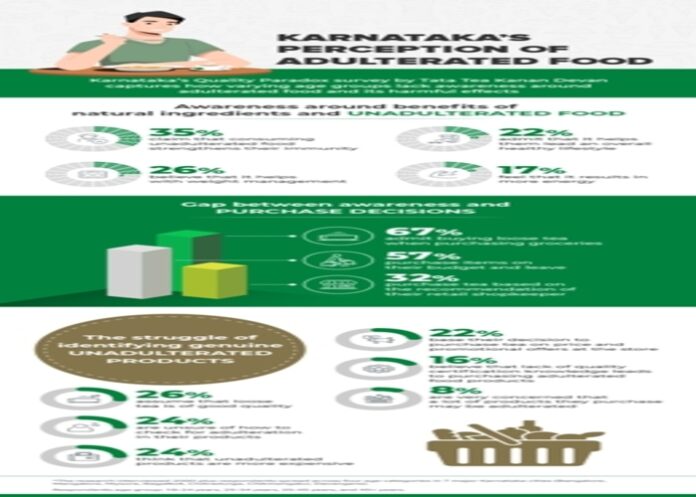Karnataka’s leading tea Kanan Devan launches ‘Karnataka Quality Paradox’ to drive awareness on the harmful effects of adulterated food products
Highlights:
- The research interviewed 2000 plus respondents spread across four age categories in 7 major Karnataka cities (Bangalore, Mangalore, Mysore, Bagalkot, Chitradurga, Chikmangalur, Davangere)
- 67% of respondents admitted to buying loose tea when purchasing groceries
- One-in-every-six respondents believe that purchasing adulterated food products is due to lack of quality certification knowledge
- Almost 24% people are unsure how to check for adulteration in their products
New Delhi, January 05, 2022: The pandemic has accelerated awareness towards genuine, high quality and unadulterated food products since they can impact health and wellness. However, as per the Food Safety and Standards Authority of India (FSSAI) annual report 2018-19, the percentage of food adulterated has almost doubled, from 12.8% in 2011-12 to 28% in 2018-19 [1]and most Indian consumers still fall prey to adulterated food products unknowingly. With an aim to bring out the gap between high awareness on the harmful effects of adulterated products and translating this into actual daily practice, Tata Tea Kanan Devan has revealed interesting research findings pertaining to tea through its ‘Karnataka Quality Paradox’ survey.
The extensive survey undertaken across major markets in Karnataka like Bangalore, Mangalore, Mysore, Bagalkot, Chitradurga, Chikmangalur and Davangere, gives key insights on the need to raise awareness on harmful effects of adulterated tea and the need to opt for trusted quality and pure, fresh tea. Commissioned by Tata Tea Kanan Devan, the ‘Karnataka Quality Paradox’ surveyed respondents in four age categories of 18-24, 25-34, 35-45, and 45+, and shares some of the below key findings:
- Consumers are aware of the importance of unadulterated products which are based on natural ingredients:
Consumers have never been more aware of the benefits of unadulterated products. According to the survey:
- 35% of the respondents claim that consuming unadulterated food and beverages strengthens their immunity
- More than a quarter (26%) believe that it helps with weight management
- One in every five respondents (22%) admit that it helps them lead an overall healthy lifestyle
- 17% feel that it results in more energy (Figure 1)
Factors such as the rise in demand for unadulterated products, concern for food safety, stringent regulations and laws for food products, increase in the adoption of organic products, and the mandate to meet the export standards with increased global food trade is projected to drive the growth of the food certification market[2].
- In spite of such awareness, consumers may still end up purchasing adulterated food products
Generally, consumers are not aware of adulteration in food products while making purchases. While awareness about the benefits of pure products remains high, the actions taken is not in sync with this awareness. This behaviour is more prevalent in daily use food items like tea.The data suggests that:
- 57% of the respondents consider grocery shopping a tedious chore or simply pick up items on their budget and leave (Figure 2)
- Nearly a third of the respondents (32%) purchase tea based on the recommendation of their retail shopkeeper(Figure 2)
- Consumers struggle to identify and find genuinely unadulterated products
People are often unaware of the quality checks they need to put in place before purchasing products. To illustrate:
- Nearly a quarter of respondents (24%) are unsure of how to check for adulteration in a product
- Although there are many quality brands, 24% of the respondents are still under the misconception that pure and natural products tend to be more expensive.
- 8% of the respondents are very concerned that a lot of products they buy may be adulterated (Figure 4)
- Data suggests that more than a quarter of respondents (26%) do not check anything and simply assume that loose tea is of good quality
- More than a fifth (22%) base their decision to purchase tea on price and promotional offers at the store (Figure 5)
Elaborating on the survey findings, Puneet Das, President, Packaged Beverages, India & South Asia, Tata Consumer Products Limited, said, “Karnataka Quality Paradox aims to educate consumers on the harmful effects of consuming adulterated tea, thereby encouraging them to transition to pure tea choices. The tea market has evolved dramatically in the past few years as more consumers are interested in good quality food products that offer taste as well as assurance of quality by trusted brands. Tata Tea Kanan Devan urges tea drinkers to recognize and stay aware of the right tea choice for their health and well-being”.
Kavita Devgan, Nutritionist, speaking about the Tata Tea Kanan Devan survey findings said, “More than a year into the pandemic, Indians have greatly altered their shopping and food consumption habits with a focus on choosing products for their wellbeing. Despite high awareness on the benefits of consuming pure food products, it is surprising to note the disparity in food product purchases. For instance, the report suggests that close to 67% consumers still purchase loose tea which could be adulterated, possibly leading to health issues. This can be easily prevented by opting for products from brands that are trustworthy”.
In order to promote awareness on food safety, Food Safety and Standards Authority of India (FSSAI) recommends Detect Adulteration with Rapid Test (DART), a compilation of common quick and basic tests for detecting food adulterants. These preliminary tests can be used to detect adulterants in common food products like tea, milk, spices and pulses. For e.g Exhausted tea leaves or artificial colourants can be easily identified by adding some tea leaves to a glass of water at room temperature. If the water colour changes immediately, the tea has been dyed with artificial colours and exhausted leaves. If not, the tea is free of adulterants.
[1]https://fssai.gov.in/upload/uploadfiles/files/Annual_Report_2018_19_English_28_10_2020.pdf



























